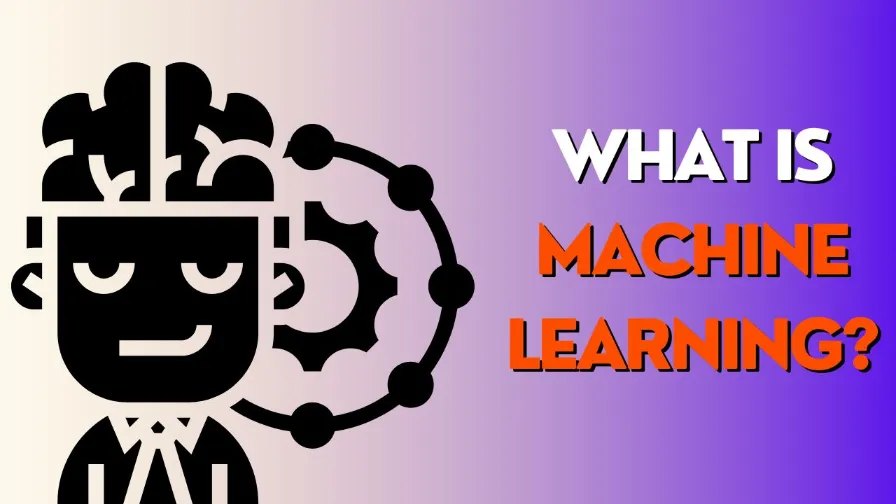In today’s tech-driven world, the term “machine learning” is everywhere. But what does it really mean? Let’s break it down in simple terms and see how it fits into our daily lives.

What is Machine Learning?
At its core, machine learning (ML) is a subset of artificial intelligence (AI) that enables computers to learn from data and make decisions without being explicitly programmed. Instead of following a fixed set of rules, machine learning algorithms analyze patterns in data, improve over time, and adapt their responses based on new information.
You’re scrolling through a streaming service like Netflix after a long day. You start to notice that the platform recommends shows and movies that align perfectly with your taste. Ever wonder how it does that? Its a best example of Machine Learning.
Also Read- Content Writing
How Does Machine Learning Work?
Machine learning involves three key steps, which is given below.
- Data Collection: The first step is gathering data, which can come from various sources—anything from social media interactions to sales records.
- Training the Model: Once the data is collected, it’s used to train a machine learning model. This involves feeding the model large amounts of data so it can learn the patterns and relationships within that data.
- Making Predictions: After training, the model can make predictions or decisions based on new, unseen data. As it encounters more data, it continues to learn and improve its accuracy.
Daily Uses of Machine Learning
Machine learning is no longer a futuristic concept; it’s an integral part of our everyday experiences. From the moment we wake up to when we go to bed, machine learning is working behind the scenes, enhancing convenience and efficiency. Let’s explore some of the most common ways machine learning impacts our daily lives.
| Daily Uses of Machine Learning |
|---|
| Personalized Recommendations |
| Smart Home Devices |
| Health Monitoring |
| Navigation and Traffic Management |
| Virtual Assistants |
| Fraud Detection |
1. Personalized Recommendations
Whether you’re binge-watching a new series on Netflix or scrolling through playlists on Spotify, machine learning algorithms analyze your preferences to suggest content tailored just for you. By studying your viewing and listening habits, these platforms curate recommendations that align with your taste.
2. Virtual Assistants
Smart assistants like Siri, Alexa, and Google Assistant leverage machine learning to understand voice commands and improve over time. They learn your preferences, making them more effective at helping you manage tasks, set reminders, or answer questions.
3. Navigation and Traffic Management
Apps like Google Maps and Waze use machine learning to analyze traffic patterns and suggest the best routes in real time. They learn from historical data and user inputs, helping you avoid congestion and reach your destination faster.
4. Smart Home Devices
From smart thermostats that learn your schedule to security cameras that recognize familiar faces, machine learning makes our homes more efficient and secure. These devices adapt to your routines, optimizing energy use and enhancing safety.
5. Health Monitoring
Wearable devices like fitness trackers use machine learning to monitor your health metrics. They analyze data such as heart rate, sleep patterns, and activity levels, providing insights that can help you make better health decisions.
6. Fraud Detection
Banks and credit card companies use machine learning algorithms to detect unusual transaction patterns that may indicate fraud. By learning from historical data, these systems can quickly flag suspicious activities, protecting your finances.
7. E-commerce
Online shopping platforms like Amazon use machine learning to enhance the customer experience. They analyze your browsing and purchase history to recommend products, optimize pricing, and personalize marketing efforts, making your shopping experience seamless and enjoyable.
Why Does It Matter?
Machine learning isn’t just about convenience; it’s transforming industries. From healthcare (predicting patient outcomes) to finance (detecting fraudulent transactions), ML is making processes smarter and more efficient.
Key Takeaways
- Adaptability: Machine learning systems can adapt and improve over time.
- Data-Driven: The more data they have, the better they perform.
- Ubiquity: ML is all around us, enhancing our experiences in various applications.
Machine learning might sound complex, but its essence is simple: it’s about teaching computers to learn from data and make our lives easier. Whether it’s recommending your next favorite show or improving business processes, ML is a powerful tool that’s shaping our future. So, next time you enjoy a personalized recommendation, you’ll know the smart technology working behind the scenes!